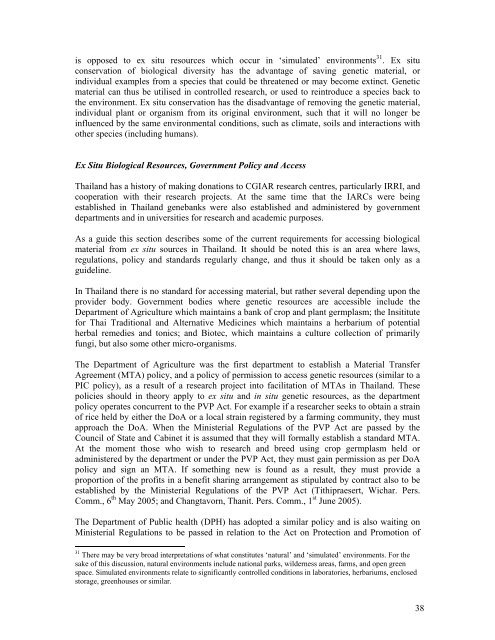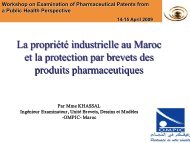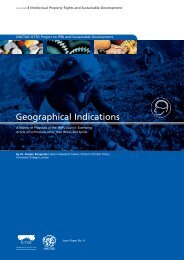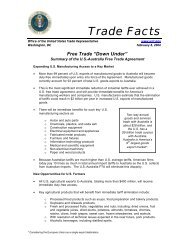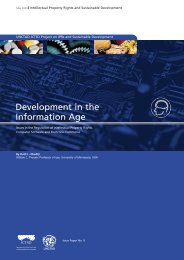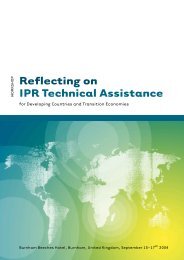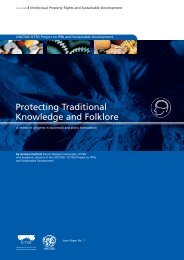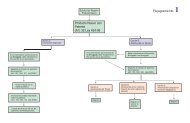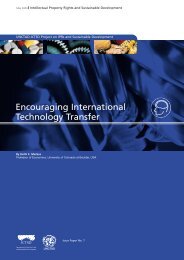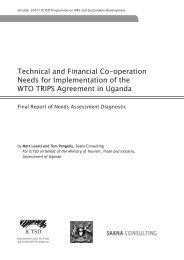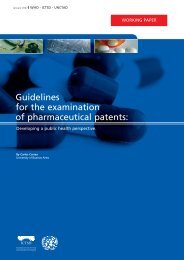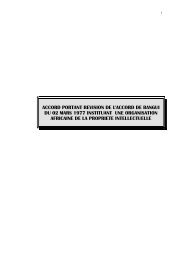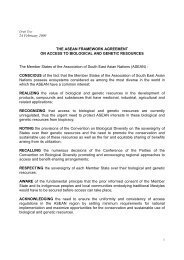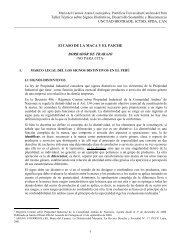Governance and Micropolitics of Traditional ... - IPRsonline.org
Governance and Micropolitics of Traditional ... - IPRsonline.org
Governance and Micropolitics of Traditional ... - IPRsonline.org
Create successful ePaper yourself
Turn your PDF publications into a flip-book with our unique Google optimized e-Paper software.
is opposed to ex situ resources which occur in ‘simulated’ environments 31 . Ex situ<br />
conservation <strong>of</strong> biological diversity has the advantage <strong>of</strong> saving genetic material, or<br />
individual examples from a species that could be threatened or may become extinct. Genetic<br />
material can thus be utilised in controlled research, or used to reintroduce a species back to<br />
the environment. Ex situ conservation has the disadvantage <strong>of</strong> removing the genetic material,<br />
individual plant or <strong>org</strong>anism from its original environment, such that it will no longer be<br />
influenced by the same environmental conditions, such as climate, soils <strong>and</strong> interactions with<br />
other species (including humans).<br />
Ex Situ Biological Resources, Government Policy <strong>and</strong> Access<br />
Thail<strong>and</strong> has a history <strong>of</strong> making donations to CGIAR research centres, particularly IRRI, <strong>and</strong><br />
cooperation with their research projects. At the same time that the IARCs were being<br />
established in Thail<strong>and</strong> genebanks were also established <strong>and</strong> administered by government<br />
departments <strong>and</strong> in universities for research <strong>and</strong> academic purposes.<br />
As a guide this section describes some <strong>of</strong> the current requirements for accessing biological<br />
material from ex situ sources in Thail<strong>and</strong>. It should be noted this is an area where laws,<br />
regulations, policy <strong>and</strong> st<strong>and</strong>ards regularly change, <strong>and</strong> thus it should be taken only as a<br />
guideline.<br />
In Thail<strong>and</strong> there is no st<strong>and</strong>ard for accessing material, but rather several depending upon the<br />
provider body. Government bodies where genetic resources are accessible include the<br />
Department <strong>of</strong> Agriculture which maintains a bank <strong>of</strong> crop <strong>and</strong> plant germplasm; the Insititute<br />
for Thai <strong>Traditional</strong> <strong>and</strong> Alternative Medicines which maintains a herbarium <strong>of</strong> potential<br />
herbal remedies <strong>and</strong> tonics; <strong>and</strong> Biotec, which maintains a culture collection <strong>of</strong> primarily<br />
fungi, but also some other micro-<strong>org</strong>anisms.<br />
The Department <strong>of</strong> Agriculture was the first department to establish a Material Transfer<br />
Agreement (MTA) policy, <strong>and</strong> a policy <strong>of</strong> permission to access genetic resources (similar to a<br />
PIC policy), as a result <strong>of</strong> a research project into facilitation <strong>of</strong> MTAs in Thail<strong>and</strong>. These<br />
policies should in theory apply to ex situ <strong>and</strong> in situ genetic resources, as the department<br />
policy operates concurrent to the PVP Act. For example if a researcher seeks to obtain a strain<br />
<strong>of</strong> rice held by either the DoA or a local strain registered by a farming community, they must<br />
approach the DoA. When the Ministerial Regulations <strong>of</strong> the PVP Act are passed by the<br />
Council <strong>of</strong> State <strong>and</strong> Cabinet it is assumed that they will formally establish a st<strong>and</strong>ard MTA.<br />
At the moment those who wish to research <strong>and</strong> breed using crop germplasm held or<br />
administered by the department or under the PVP Act, they must gain permission as per DoA<br />
policy <strong>and</strong> sign an MTA. If something new is found as a result, they must provide a<br />
proportion <strong>of</strong> the pr<strong>of</strong>its in a benefit sharing arrangement as stipulated by contract also to be<br />
established by the Ministerial Regulations <strong>of</strong> the PVP Act (Tithipraesert, Wichar. Pers.<br />
Comm., 6 th May 2005; <strong>and</strong> Changtavorn, Thanit. Pers. Comm., 1 st June 2005).<br />
The Department <strong>of</strong> Public health (DPH) has adopted a similar policy <strong>and</strong> is also waiting on<br />
Ministerial Regulations to be passed in relation to the Act on Protection <strong>and</strong> Promotion <strong>of</strong><br />
31 There may be very broad interpretations <strong>of</strong> what constitutes ‘natural’ <strong>and</strong> ‘simulated’ environments. For the<br />
sake <strong>of</strong> this discussion, natural environments include national parks, wilderness areas, farms, <strong>and</strong> open green<br />
space. Simulated environments relate to significantly controlled conditions in laboratories, herbariums, enclosed<br />
storage, greenhouses or similar.<br />
38


